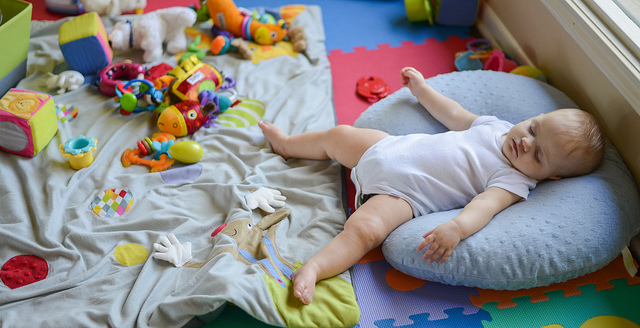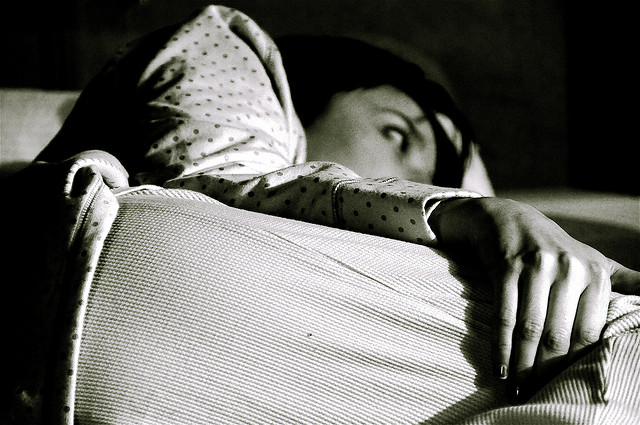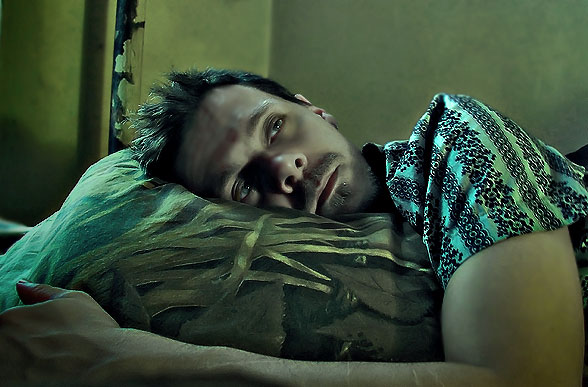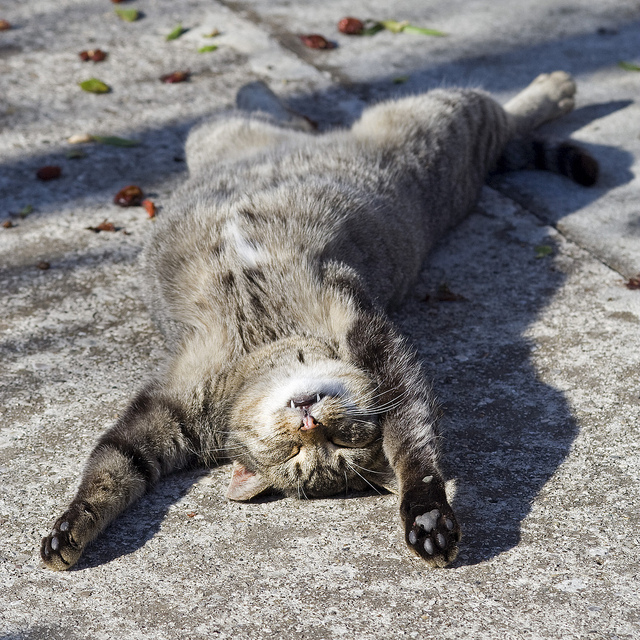20 Tips to Troubleshoot Your Sleep so that you can Spring out of Bed Each Morning Ready to Dominate Your Day (a No-Nonsense, Step-by-Step Guide on Sleeping Well)

I never understood that phrase, “sleep like a baby.” I mean, who in their RIGHT MIND would want to sleep like a baby? Let me tell YOU! I’ve had my fair share of babies in my life – and the Siffer-family has got another one coming in a matter of weeks. And I can tell you for a FACT that, many times, they wake up every hour or two – SCREAMING. So, thanks, but I’d rather not sleep like a baby. So, I don’t know. Maybe I’d rather sleep like a teenager. Or heck, like a professional athlete, or a lion, anything but a baby!
All that said, by now, I hope we all know that sleep is really – REALLY – important for not only your health, fitness, and quality of life, but also for your personal effectiveness each and every day, among many other things. Basically, your entire human experience will be largely affected by sleep, or the lack thereof. And there’s a very strong case for the argument that sleep is even more important than both your diet and workout program. But we rarely think twice about the commodity…I mean…necessity of sleep – even though we spend roughly one third of our lives sleeping.
We have every reason in the world to make our sleep a high priority. And if you’re not convinced or you need proof, or if you think that sleep deprivation doesn’t affect you – that you’re fine (you’re wrong, by the way, and science has proven it) – I’d encourage you to check out some of the insightful TED talks on the subject. I particularly enjoyed this one by circadian neuroscientist Russell Foster. And this is another good one by Dr. Kirk Parsley, who is a former Navy SEAL turned sleep researcher.
Needless to say, you’re gonna want to get this one right. And yet, we’re still struggling to get enough quality sleep. Roughly one in three Americans is chronically sleep-deprived, and about one in five Americans have a sleep disorder. And many other people struggle with sleep in one way or another.
The good news is that we not only have a very clear idea of how much sleep we need (i.e. 7-9 hours most nights for most people, but it does vary based on age and there is some slight individual variance, too) – so at least we have a target in mind – but we also know how to make it happen. And fortunately, in most cases, there are just a few things you’ll have to do to start getting a good night’s sleep. Oftentimes, a few changes can make all the difference. And I’d bet the changes that would make the biggest difference for you are somewhere on the list below.
So, we know exactly what needs to be done. The hard part, of course, is doing it – and making it happen on a regular basis. Sometimes, it’s just not possible to get the sleep that we need, and we have to do the best we can with the time we’ve got.
Now, there is all kinds of fascinating information about sleep out there – not only concerning how a lack of sleep affects us, but also how a good night’s rest helps us in so many ways. And it does help everything – across the board. But you know me. I’m all about the practical stuff. And so, instead of writing up an encyclopedic novel about all the ins-and-outs of sleep, and the various benefits, etc., I’ve simply decided to provide you with 20 reasons why you’re not getting a good night’s sleep, along with some actionable ideas on what you can do about it. You can think of it as your own personal sleep troubleshooting guide.
20 Reasons Why You’re Not Getting a Good Night’s Sleep (and what to do about it)
1) You don’t sleep on a regular schedule.
If you’re constantly changing the time(s) that you either go to bed and/or get up, then your body’s internal clock gets all out of whack, especially when you combine this problem with a few of the others below (e.g. like prolonged exposure to artificial light after sunset).
Solution: The best-case scenario is that you go to sleep and wake up at exactly the same time every single day. So, while it may not always be attainable, that should be the goal! So, work towards it. The closer you get to this ideal, the better you’ll sleep. You can even try setting an alarm to remind you that it’s time to start getting ready for bed!
Note: this is arguably one of the most important tips on this entire list! So, don’t overlook or downplay it. The timing matters!
2) You don’t sleep enough.
If you don’t sleep enough, then most of the other tips on this list will be of little help. Sure, there will always be people out there who are trying to “hack sleep,” and survive on just a few hours a night. But the verdict is in, and that kind of practice will only lead to problems down the road. It’s just not sustainable. So, just because you can do it, doesn’t mean you should. And in this case, it’s NOT a good idea.
Solution: Do what the experts have been recommending for a long time and aim for 7-9 hours of sleep based on your own individual needs. Obviously, this is easier said than done, but that’s what the rest of these tips are for. And if you’re not sure how much sleep you need (is it 7 hours or 9 hours?), then check out this simple self-test here: Figure Out Exactly How Much Sleep You Need With This Simple Self-Test.
Note: in rare cases, some people may need even more than nine hours, and in even rarer cases, you may be able to do just fine with less than seven hours.
3) You go to bed really late (e.g. after midnight) and force yourself to wake up – interrupting your body’s rest process – with an alarm clock well-before you’ve gotten enough rest.
This one’s got “disaster” written all over it. If you’re forcing yourself to stay up late or get up before you’ve had enough rest, then you’re in good company. Many Americans do exactly this every single night. The problem is that not only are you hi-jacking your body’s normal recovery process, but you’re digging yourself deeper into a hole each time you subject yourself to this. And if it’s been a chronic issue for months or years, then chances are high that there are all sorts of problems resulting from it – whether you’re aware of them or not.
Solution: It’s time to get real about your resting habits. You’ll have to make a decision if this is something you want to commit to improving. If you’re willing to move in a healthier direction, then you’ll need a plan, and a system to see it through. It won’t be easy, but if you got yourself into this mess, then you can get yourself out of it. Start with something as simple as this:
Plan: determine the time you must wake up in the morning and then figure out the time that is at least seven hours before then. For example, if you have to wake up at 6am, then 11pm is when you should be asleep each night. Note that I said “asleep,” and not just climbing into bed. If it takes you 15 minutes to get to sleep, which is normal, then you should be in bed with the lights out at 10:45pm. Then create a trigger to remind you that it’s time to get ready for bed. This can be an alarm on your phone, an email, or a sticky note in a key location. After you’ve got the timing figured out, create a simple wind-down routine (see below).
4) You don’t have an evening ritual or wind-down routine to get you ready for bed.
If you finish your day’s activities and then just hop into bed without winding down, you may have a hard time falling asleep. Your mind and body might still be racing, especially if you haven’t had a chance to relax. For some people, it’s very difficult to change gears and begin to rest.
Solution: Create a simple routine that you do every night before bed that will get your body into the habit of winding down and reinforcing the fact that it’s time to rest. This can be anything from reading a book (fiction is preferable), to taking a bath or shower, or doing some gentle exercise like yoga or even deep breathing. Obviously, it should also include all of the other little things you’d normally do before bed like brushing your teeth, taking the dog out one last time, etc. Whatever you decide, make it a routine, and stick with it.
Apart from taking the dog out and brushing my teeth (etc.), here’s a routine I follow more-or-less each night.
- dim lights
- journal
- read
- yoga
- box breathing (aka square breathing)
Note: box breathing is a legitimate “hack” that can help you fall asleep – works like a charm for me!
5) You don’t get much, if any, physical activity or exercise during the day.
Exercise has been shown time and time again to help us sleep better. It’s reason number 1,000 to exercise. So, if you’re having trouble sleeping, getting a little bit of exercise sometime during the day will likely help quite a bit. Doing it out in the sunshine would be a bonus.
Solution: Make a daily habit of getting some kind of physical activity. This can be anything from some strength training to cardiovascular exercise or simply a form of physical activity or recreation like going for a walk, a hike, playing basketball, doing yoga, etc. If possible, schedule your exercise at least 3-6 hours BEFORE bed, and avoid high intensity exercise immediately before bed since this can disrupt your sleep patterns.
Note: if I was a doctor (and I’m NOT – in case you were wondering), and you came to me with a concern over a mostly-preventable health condition such as trouble sleeping, obesity, (etc.) and I found out that you were NOT exercising regularly – in any way, shape, or form – I might just have to lay the smackdown! But in all seriousness, don’t neglect this one. It’s too important.

6) You don’t get much exposure to sunlight during the day.
It may sound counter-intuitive, but being out in the sun during the day actually helps you sleep at night. Exposure to sunlight, especially in the morning hours soon after waking, helps to regulate your body’s internal clock. This gets everything online and on track at the right time, which also makes it easier to get the sleep you need when night time finally arrives. On the flip side, not getting much, or any, sun exposure is a sure-fire way to disrupt your normal sleep patterns.
Solution: This one’s easy. Get as much exposure to natural light as possible throughout the day (e.g. go outside, take the window seat, etc.). And ideally, spend some time outdoors in the sunshine, preferably, immediately after waking up. There are a lot of other benefits to this, apart from the improved sleep.
7) You drink alcohol or caffeine towards the end of the day, or worse yet, right before bedtime.
Both alcohol and caffeine will interfere with your body’s ability to sleep to varying degrees. It may be true that a glass of wine helps you to wind down and relax at the end of the day. And it may even make you feel sleepy. But it will also interfere with your sleep process, too – whether you know it or not. Alcohol should never be used as a sleep aid. And it should be avoided altogether if you’re having trouble getting enough quality sleep because it will only compound the problem.
Solution: Limit alcohol consumption, especially within a few hours of bedtime. And limit caffeine intake (coffee, soda, etc.) to before lunchtime. In the evening, if you want something other than water to drink, try a hot drink like tea instead. Some herbal teas, such as chamomile, may even serve as a mild sleep aid, too. Although, research is limited in this area.
Note for coffee drinkers: it takes about six hours for half of the caffeine in an 8 oz cup of coffee to be eliminated. Six hours for just HALF of an 8 ouncer! So, just between you and me, you might want to have your last coffee for the day by early afternoon.
Note for alcohol drinkers: It takes roughly the same amount of time for .08 blood alcohol concentration (ie legally impaired) to be removed from your system (i.e. several hours). So, in case it isn’t clear, alcohol and quality sleep don’t mix well. Just food for thought.
8) You eat or drink too much before bed.
If you drink too much right before bed, and your body doesn’t have enough time to eliminate the waste (i.e. it takes about 90 minutes, on average, for liquid to get through your system), you’ll likely wake up in the middle of the night with a full bladder. Pretty self-explanatory. Similarly, if you eat right before bed, especially a large meal, it may disrupt your normal sleep pattern, too.
Solution: If you have to get up each night to use the loo, then avoid liquids at least 90 minutes before bed. Also, avoid eating spicy foods and heavy/large meals before retiring for the night. In the same vein, being really hungry can also make it hard to fall asleep. So, a light snack before bed can sometimes help in that regard.
9) Your mind is supercharged right before bed and you just can’t stop thinking.
If you’re a certified night-owl and your mind comes alive when you would normally be sleeping, then you really only have two options. You can either accept it and reorganize your life around this trait (i.e. stay up late). Or, you can still try to get to bed at a reasonable hour, and do everything in your power to set yourself up for success, and then see if things change/improve over time.
Solution: If you just can’t stop thinking, then as part of your evening ritual (which will be a critical task for you!), take a few minutes to write everything that’s on your mind down onto a list. And I mean EVERYTHING – that email you forgot to send, what you need to tell so-and-so, that idea you had, the solution to the problem at work. Whatever it is, get it out of your head and down on paper – even if the thought isn’t 100% clear to you yet. After you’ve done your brain dump, you can acknowledge that these things can wait, and you’ll be much better able to address them after a good night of sleep. This process will help reassure you that what’s on your mind is important, but that it can wait until morning. If that doesn’t work, then you can also try reading a fiction book that will take you into another world, and thus, help take your mind off of the to-do list. I’ve found that keeping a notepad by your bed may also be helpful.
Note: if this is a chronic problem, then training in mindfulness, meditation, and breathing exercises may help. I’d recommend the book The Way of the SEAL to help you get started.
10) You’re overly stressed out and can’t tune it down.
If you’re so stressed out that you can’t sleep, you’re going to have to learn some short-term stress management techniques and chip away at the big picture stuff, that’s causing the stress (e.g. your job, a relationship, etc.), as best you can
Solution: Gentle exercise such as joint mobility or yoga can be done before bed to relax. Or, even just a short walk. But you can also take a bath, a shower (hot or cold can both be effective), or do some light reading – anything that will help you relax and take your mind off of things. So, whatever it is that de-stresses you the best, do that! But if you want a quick-fix that actually works every time, here you go: How to Relieve ANY Type of Stress and Relax Yourself Instantly With This Simple Breathing Trick. It’s free and easy, and it works like clockwork.

11) You’re exposed to artificial light after sunset.
Our body’s are designed to start winding down after sunset. It’s just how things naturally happen (or, at least, how they are supposed to happen). So, when you’re surrounded by light in the evening, your body might not get the message, especially if it happens every night.
Solution: Do everything in your power to limit artificial light exposure after sunset (particularly blue light), and especially within 30 minutes of bedtime. So, use as few lights as necessary to find your way around the house. If you have dimmers, use them. Or, use candles, if you prefer. Oh, and don’t stare at your TV for hours at night. Speaking of which…
12) You stare at a TV/computer/phone screen after sunset, and perhaps leading up until bedtime.
This is fast becoming a major no-no for the sleep deprived. Exposure to artificial light, and in particular, blue light (like the kind that is produced by every electronic screen and almost every light bulb), after the sun has gone down will suppress your body’s melatonin production (a hormone that is largely responsible for regulating your circadian rhythm and making you feel sleepy). This, in-and-of-itself can completely undermine a good night’s sleep.
Solution: Severely limit your screen time for at least 30 minutes before bed. Ideally, you wouldn’t stare at any screens after sunset. But I understand that some of you have your smart phones surgically implanted. So, I repeat. No screen time for at least 30 minutes before bed, and do your best to limit them after sunset. Oh, and if you have a TV in your bedroom, get it out of there! Also, if you usually bring your smart phone to bed, and are using/checking it often or using it as an alarm clock, move it outside of the room. You can also install a light dimming program like f.lux on your computers (also available for some smart phones and tablets), and you can use Twilight if you have an Android phone. Both are free and will limit blue-light emissions on your screens.
Note: if you’re going to stare at your TV, computer, or smart phone anyways, then at least wear some blue light blocking glasses like these. Or, if you’re really stylin’, try this pair. My wife and I use these whenever we watch a movie at night, and we do notice that it’s easier to fall asleep afterward. And yes, we’re dweebs.
13) You sleep in a room that is not completely dark.
The human body sleeps best when it is in complete darkness. Think caveman. So, if there are any lights in or near your sleeping area…kill them! Kill them all!
Solution: Keep the lights in your bedroom off. Heck, get rid of your bedroom lights. No, not even a little night light that only puts out a single watt. Get rid of it! And cover up the little electronic lights on everything in and near your bedroom (and on the way to the bathroom if you tend to get up in the middle of the night). Put a piece of black electrical tape over all those other tiny lights that stay on or blink during the night to tell us that things are off. Install black-out shades on your windows (or use aluminum foil for an inexpensive option). Put your alarm clock in a drawer. Or, better yet, outside of your bedroom. And when all else fails, wear a sleep mask (particularly helpful if your bed mate(s) prefer some light in their room). That’s a $1 tip that just might make the difference.
14) You have a nutrition deficiency.
Magnesium deficiency has been linked to impaired sleep quality. So, if you find that you’re magnesium deficient, making some changes to your diet or even supplementing may help.
Solution: If you are magnesium deficient, start eating some foods that are high in it (e.g. spinach, pumpkin seeds, yogurt, kefir, almonds, black beans, avocado, figs, etc.). Or, you can just take a magnesium supplement. You can also try supplementing with melatonin, which is a hormone that helps regulate sleep – just be careful not to become dependent on it. Also, lavender oil has been shown to improve sleep quality, too. You can check out the Examine.com Supplement Guides for more information on supplementation for improving sleep.
15) You nap too close to bedtime or for too long.
Naps are great, but if you take naps too close to bedtime, it can interfere with your sleep (especially long naps).
Solution: Don’t nap within 6 hours of your normal bedtime. And if you do nap, make sure it’s not longer than 2 hours.

16) You’re too warm or you sleep in a room that is too warm.
The ideal air temperature for sleeping is between 60-68 degrees Fahrenheit (i.e. 16-20 Celsius). But there is some individual variance from person to person. So, the point is that you want to be comfortable. You don’t want to feel cold or warm when going to bed, but comfortable and cool.
Solution: Keep your room as close to 68 degrees as possible. Set your thermostat, use a window A/C unit, and/or try different bed sheets – whatever it takes.
17) You are a light sleeper and wake up at the slightest noise.
If you wake up to barking dogs, sirens, loud neighbors, snoring, or something else, you may want to do something about that!
Solution: Use a noise machine. Turn on a fan. Play music. Or, get some ear plugs. For best results, invest in a set that is meant for sleeping or for shooting guns. You want industrial-grade hearing protection!
18) You can’t get comfortable in bed.
You should be able to completely relax when you lay down in bed. If you can’t get comfortable, something’s definitely wrong! It could be a lousy mattress that results in stiffness or pain, or maybe you’re too hot or too cold. Or, it could be something else. The point is that something needs to be done about it if you want to get a good night’s sleep.
Solution: Try sleeping in different positions (back, side stomach, army-style, etc.). And if you find yourself shifting sleep positions often, you might want to consider getting a new mattress (or flipping/rotating your mattress). And if you keep waking up cold or hot, try different bed linens, turn on a fan, or get a heating blanket.
Note: if you sleep on your back, do yourself a favor and learn corpse pose. Try combining that with some box breathing once you’ve crawled into bed. You can thank me later.
19) You simply don’t manage your time well.
Sometimes, the problem isn’t sleep-related at all. Maybe you’re saving important tasks for the end of the day. Or, maybe you’re just wasting time watching TV or surfing the Internet when you should be sleeping. Maybe you’ve just got too much on your plate. Regardless, if you don’t manage your time well, your sleep will probably suffer.
Solution: Much has been written about time management, and this short summary won’t do it justice. But here is a basic formula for what to do when you’re not managing your time well.
1) stop doing things that aren’t important to you (i.e. do less – this book will teach you how).
2) start doing the things that are important to you – make time for them, and try to get the most important tasks done early in the day when possible.
3) use a checklist that is prioritized and scheduled in advance
4) give yourself a hard deadline for sleep (e.g. “I will be in bed by 10pm every night).
20) You’ve tried to sleep better before and failed.
Okay. You’re right. You’re doomed.
But all kidding aside, you’re not the first one to struggle with sleep. Over 100 million Americans don’t sleep well. The ones who make it work are the ones who don’t give up.
Solution: Don’t give up! You don’t need to get everything about your life and your sleeping habits perfect in one fell swoop. Adjust things gradually. Think long-term. Baby steps. You might find that just a couple of the tips above make a big difference for your personally. And some of the tips are very easy to implement. They don’t take any extra time or effort. They just require that you do things differently. Maybe you should start with those. I guarantee that some of the tips on this list will have immediate benefits, as soon as today, tonight.
Final Words
Listen. I get it. You have a life. And while an optimized sleep schedule may be critically important, it isn’t necessarily your top priority. You’ve got work to do, and social engagements, and you need time for yourself, too. Plus, there are all sorts of things you can’t control that will interfere with your sleep routine. There are babies to feed, kids to take care of, and other things that just can’t wait – like getting back to all those late-night text messages and catching up on your favorite show. Life happens.
So, the reality is that some people will not be able to truly optimize their sleeping habits and get a good night’s rest every single night. But the point is that you CAN set yourself up for overall success by making some of these changes (and perhaps some others that didn’t make the list).
In closing, I will tell you this: making a commitment to prioritize your sleep will always – ALWAYS – be worth it. So, before you go, do this…
Action Item: I’d suggest writing down the most important habits that you need to implement (or the easiest ones if you’re motivation-challenged), and then make it happen… tonight! Sweet dreams.
If you found this article helpful, please share it with your friends:

.jpg)
![]()
Health-First Fitness Coach
P.S. If you liked this post, then please signup for the newsletter, or follow me on Facebook or Twitter for daily updates and other interesting info.
